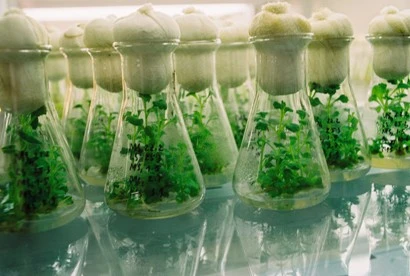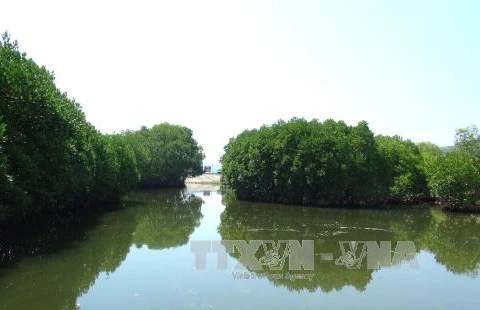Hanoi (VNA) - A newly effective bill, the government’s Decree No. 59/2017 on the management of access to genetic resources and the sharing of their benefits (issued on May 12, 2017), is expected to protect the country’s rich genetic resources.
In 1992, the World Conservation Monitoring Centre ranked Vietnam the 16th most biologically diverse country in the world, while the World Bank said “the entire country is included within Conservation International’s Indo-Burma hotspot, one of the earth’s richest and most threatened biological regions.”
Nguyen Dang Thu Cuc, head of the Division of Genetic Resources and Biosafety Management, under the Vietnam Environment Administration, said machinery and human capacity in the country remain limited, therefore genetic samples are usually sent abroad for analysis, and “this is a notable source of loss of genetic resources.”
She cited the recent case of an American university’s 2016 finding what they claimed to be an “anti-cancer” agent in Cuc Phuong National Park during various trips held with Vietnam’s institutions in the 1990s.
“This is a lucky case, as they credited the source of the agent, whereas there are several other cases, where previously lax legal provisions allowed unscrupulous foreign parties to ‘steal’ genetic resources discovered in Vietnam to claim as their own, and make profit from it, is that fair?,” Cuc said, during a workshop on Decree 59 in Hanoi on July 19.
The decree, years in the making, aims to remedy this situation by providing a “tighter protocol in granting access to national genetic resources to a foreign entity.”
The creators of the decree admitted that this is Vietnam’s first legal document that addresses in detail the country’s compliance to the 2010 Nagoya Protocol on the use of genetic resources, so there might be issues translating the document to reality.
These issues can be addressed in later revisions “as soon as every two years, instead of the usual five-year-window” from experience gained in the implementation period, said Nguyen Van Tai, head of the Vietnam Environment Administration.
Ass Prof Dr Le Van Hung, from the Environment Department of the Hanoi-based University of Natural Resources and Environment, said that the current term requiring that 30 percent of monetary benefits gained from using genetic resources from a provider shall be paid back to the provider is too high.
Hung said the international standard of 0.5-3 percent is appropriate, as long as a solid valuation mechanism is in place, since “in many cases, only much later after the genetic sample was collected, could it be utilised in a commercial product.”
Other participants also voiced concerns over administrative paperwork, however, lawmakers responded that follow-up guiding documents would “iron out the wrinkles”, including an expedited mechanism for academic institutions working with international parties.
A civil society representative said attention should also be focused on the community aspect, namely “folk wisdom.”
The representative cited the example of traditional medicine made from local herbs by ethnic groups in the northern mountainous province of Ha Giang, saying if a pharmaceutical firm wants to commercialise such products, measures should be in place to help the community "strike a fair deal with those companies."
Decree 59 defines the Ministry of Natural Resources and Environment as the “national focal point” for the implementation of the Nagoya Protocol. Together with the Ministry of Agriculture and Rural Development, the two have the power to “grant, extend, or revoke access licences to genetic resources.”-VNA
In 1992, the World Conservation Monitoring Centre ranked Vietnam the 16th most biologically diverse country in the world, while the World Bank said “the entire country is included within Conservation International’s Indo-Burma hotspot, one of the earth’s richest and most threatened biological regions.”
Nguyen Dang Thu Cuc, head of the Division of Genetic Resources and Biosafety Management, under the Vietnam Environment Administration, said machinery and human capacity in the country remain limited, therefore genetic samples are usually sent abroad for analysis, and “this is a notable source of loss of genetic resources.”
She cited the recent case of an American university’s 2016 finding what they claimed to be an “anti-cancer” agent in Cuc Phuong National Park during various trips held with Vietnam’s institutions in the 1990s.
“This is a lucky case, as they credited the source of the agent, whereas there are several other cases, where previously lax legal provisions allowed unscrupulous foreign parties to ‘steal’ genetic resources discovered in Vietnam to claim as their own, and make profit from it, is that fair?,” Cuc said, during a workshop on Decree 59 in Hanoi on July 19.
The decree, years in the making, aims to remedy this situation by providing a “tighter protocol in granting access to national genetic resources to a foreign entity.”
The creators of the decree admitted that this is Vietnam’s first legal document that addresses in detail the country’s compliance to the 2010 Nagoya Protocol on the use of genetic resources, so there might be issues translating the document to reality.
These issues can be addressed in later revisions “as soon as every two years, instead of the usual five-year-window” from experience gained in the implementation period, said Nguyen Van Tai, head of the Vietnam Environment Administration.
Ass Prof Dr Le Van Hung, from the Environment Department of the Hanoi-based University of Natural Resources and Environment, said that the current term requiring that 30 percent of monetary benefits gained from using genetic resources from a provider shall be paid back to the provider is too high.
Hung said the international standard of 0.5-3 percent is appropriate, as long as a solid valuation mechanism is in place, since “in many cases, only much later after the genetic sample was collected, could it be utilised in a commercial product.”
Other participants also voiced concerns over administrative paperwork, however, lawmakers responded that follow-up guiding documents would “iron out the wrinkles”, including an expedited mechanism for academic institutions working with international parties.
A civil society representative said attention should also be focused on the community aspect, namely “folk wisdom.”
The representative cited the example of traditional medicine made from local herbs by ethnic groups in the northern mountainous province of Ha Giang, saying if a pharmaceutical firm wants to commercialise such products, measures should be in place to help the community "strike a fair deal with those companies."
Decree 59 defines the Ministry of Natural Resources and Environment as the “national focal point” for the implementation of the Nagoya Protocol. Together with the Ministry of Agriculture and Rural Development, the two have the power to “grant, extend, or revoke access licences to genetic resources.”-VNA
VNA
























